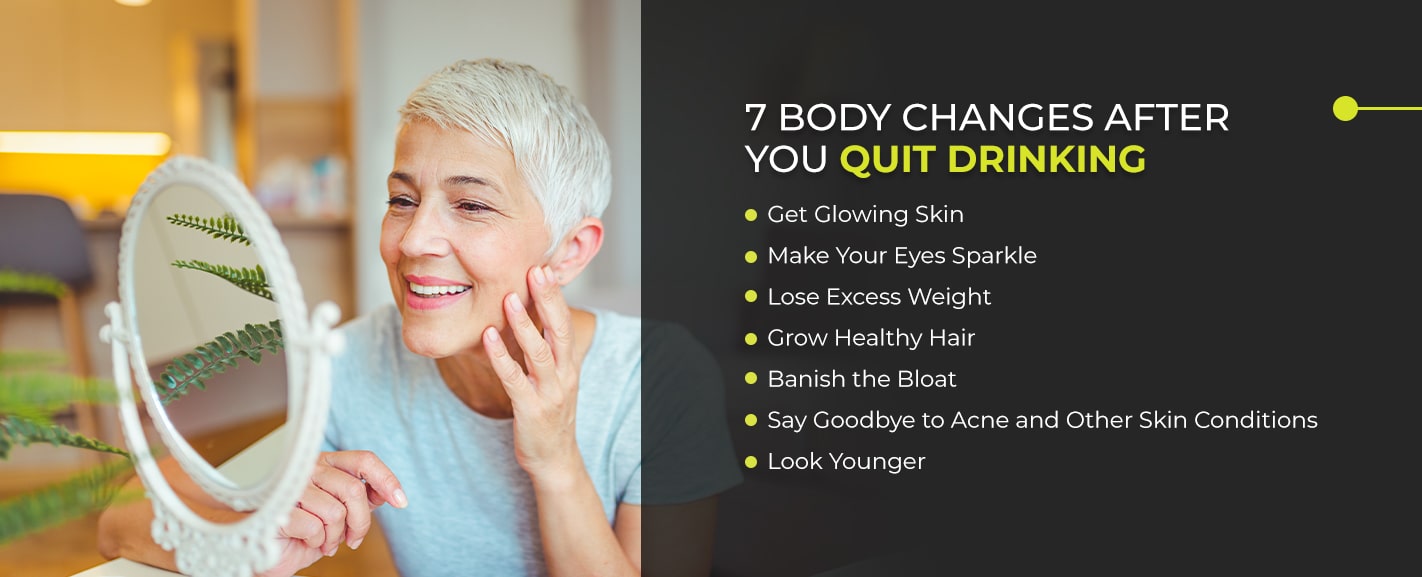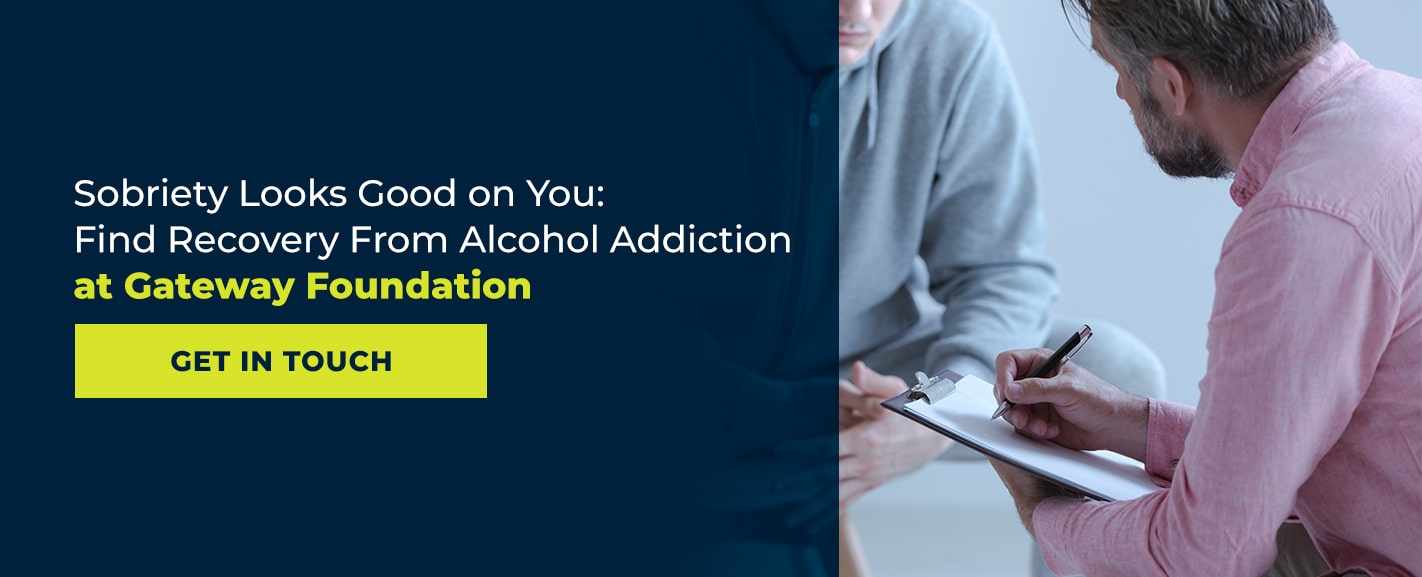- Oct 25
- Drug Addiction Treatment
Does drinking make you look older? Alcohol addiction can have a devastating effect on your relationships, career, demeanor, mental health — and, yes, on your physical appearance. From wrinkles to blemishes, the reflection in the mirror of a person who misuses alcohol offers a glimpse of the more profound damage happening under the surface.
Without question, there are countless advantages to sobriety. Recovery from addiction can restore strained relationships, positively change your life outlook and improve your health. One rarely discussed, but noticeable, benefit of recovery is how it can dramatically improve your appearance.
Read on to discover how quitting alcohol will help you feel — and look — your best.
The Effects of Alcohol on Skin and Aging
How drastically can alcohol change your appearance? As it turns out, quite a bit.
A recent study addressing the impact of smoking and drinking on facial aging in women determined that heavy alcohol use significantly impacted facial skin, including:
- More prominent under-eye bags
- Increased upper facial lines
- Visible blood vessels
- Wrinkles around the mouth
- Midface volume loss
Drinking makes your face look puffy, tired and older than your actual age. Let’s explore how alcohol impacts your look.
Does Drinking Alcohol Cause Wrinkles?
Even one night of drinking can make fine lines and wrinkles look more prominent due to dehydration. Alcohol depletes electrolytes and adversely affects tissue health. Heavy drinking ages your facial features and causes potentially irreversible skin damage, adding visible years to your appearance.
What Drinking Does to Your Face and Skin
A person struggling with alcoholism becomes unrecognizable to their loved ones, and not only in behavior. Alcohol addiction takes a toll on every aspect of your personal and professional life. It can change your personality, mental health, mannerisms and even your physical appearance.
To fully appreciate the positive effects of sobriety on your body, let’s first examine the damaging connection between alcohol and skin aging.
Alcohol consumption leads to the following issues.
- Dehydration: Increased blood flow ramps up skin cell shedding, rapidly drying out your skin. Does alcohol cause wrinkles? Alcohol dehydrates your skin and depletes essential nutrients, resulting in wrinkles and much more — enlarged pores, blotchiness, redness and puffiness.
- Puffiness and bloating: Have you ever taken a look at someone and assumed they must have been drinking the night before? Puffy eyes and bloated skin are telltale signs of alcohol use. One of the most common effects alcohol can have on the body is bloating. Drinking swells your face and skin, making you look older and heavier than you are.
- Redness and inflammation: Alcohol damages cells and causes inflammation and redness, especially in your face. Blood vessels become enlarged to allow more blood flow close to the surface of your skin, resulting in a flushed tone, discoloration and broken capillaries. If you have an enzyme deficiency, alcohol will reach a toxic level more quickly, causing a warming sensation and visible redness in your cheeks.
- Skin conditions: Alcohol disrupts your microbiome — the healthy balance of bacteria and other microbes in your body. Drinking also adds toxins and dehydrates your skin, aggravating skin conditions like psoriasis, discoid eczema, rosacea and acne.
- Weight gain: People with alcohol addiction consume an abundance of empty calories that offer no nutritional value, contributing to weight gain. Alcohol consumption increases hunger, making you eat more than you usually would, and hurts your body’s ability to burn fat in general — it slows metabolism and suppresses fat and carbohydrate oxidation. About 20% of people who drink heavily develop fatty liver disease, which prevents the liver from adequately processing fat.

7 Body Changes After You Quit Drinking
1. Get Glowing Skin
As the human body’s largest organ, skin performs several essential functions. Your skin is responsible for immunity, sensation, vitamin D production, temperature regulation and protection from microorganisms, disease and toxins. When you consume alcohol, you deprive your skin of the water and nutrients it needs to function correctly.
Within a few weeks of quitting drinking, your hydrated skin will thank you with:
- Diminished puffiness
- Reduced dryness
- Fewer wrinkles
- Elasticity
- More even tone
- Dewy glow
2. Make Your Eyes Sparkle
Bring back that twinkle in your eyes! When you consume alcohol, the peripheral blood vessels expand and blood flow to the surface of your eyes increases. Dehydration and visible blood vessels make your eyes red and dull.
Sober living brightens the whites of your eyes, creating a more luminous gaze. When the windows to your soul look vibrant, you appear more alert, refreshed and happy.
3. Lose Excess Weight
In a study examining long-term weight loss and drinking, participants who abstained from alcohol lost more weight — and kept it off — compared to those who continued to drink. Removing alcohol from your lifestyle can reduce the risk for obesity in some individuals and improve healthy weight management for people with Type 2 diabetes.
Banish that beer belly, drop inches off your waistline and enjoy the energy boost. Embrace sober living to jump-start and maintain your weight loss journey.
4. Grow Healthy Hair
Elevated alcohol consumption leads to hormone imbalance, dehydration and nutrient deficiencies — altered zinc, copper and protein levels contribute to increased hair shedding, weakened follicles and stunted hair growth. Many people with alcohol addiction experience limited sleep and elevated stress that also damages hair health.
The longer you drink, the more your hair suffers. The good news is, as you remove alcohol use, your body starts to hydrate and correctly absorb nutrients — and your hair begins to repair itself! Many people in recovery report shinier, fuller hair now that they are sober.
5. Banish the Bloat
Giving up alcohol can have a significant impact on your waistline. Gastritis can cause bloating around your midsection, caused by alcohol inflaming your stomach’s lining. In addition to weight loss and reduced inflammation, sobriety reduces the water retention caused by dehydration — contributing to an overall lighter physical appearance.
6. Say Goodbye to Acne and Other Skin Conditions
Some of the most common skin conditions related to alcohol misuse are psoriasis, dermatitis and rosacea. Dermatologists confirm that women who drink alcohol have an increased risk of developing rosacea.
When you remove alcohol from the equation, the damaging factors that exacerbate rosacea, acne, eczema and a wide range of skin issues disappear, resulting in a blemish-free, clear complexion. Renewed by hydration and proper nutrient intake, your skin’s texture will improve and look healthy again.
7. Look Younger
Removing alcohol from your life is better for your skin than the most expensive face lotions and Botox combined. Sober living heals you inside and out, revitalizing your body in a way that others will notice.
The benefits are overwhelming — radiant skin, diminished wrinkles, sparkling eyes, voluminous hair and a flawless complexion shave years off your face, creating a youthful appearance you can’t find in the skin care aisle.
Sobriety and rejuvenated skin go hand in hand. Your improved appearance reflects the positive changes happening inside your body, indicating that you’re becoming healthy and renewed.
Sobriety Looks Good on You: Find Recovery From Alcohol Addiction at Gateway Foundation
Instead of spending money on skin treatments to mask the devastating physical effects of alcohol, invest in your body from the inside out — the healing found in sobriety. Gateway Foundation is here to help you take back your appearance, health and life.
The safest and most effective way to stop alcohol misuse is under the medical supervision of addiction professionals. At Gateway Foundation, our expert team provides you with compassionate care. We develop a comprehensive, customized alcohol addiction treatment for every patient, including medically supervised detoxification, psychiatric care, therapy and counseling.
On your road to finding and maintaining recovery, we are with you for life. If you’re ready to start that journey, contact us today to learn more.



